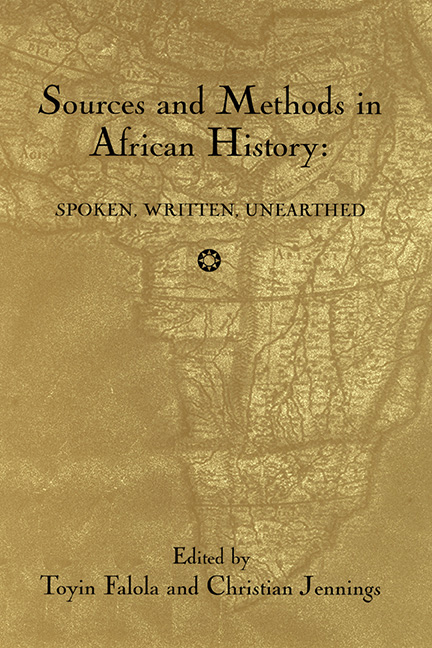Book contents
- Frontmatter
- Dedication
- Contents
- Acknowledgments
- Introduction
- Part I Archaeological Sources
- 1 Section Introduction: Archaeology and History
- 2 Trouble with Siblings: Archaeological and Historical Interpretation of the West African Past
- 3 Material Culture and Cadastral Data: Documenting the Cedarberg Frontier, South Africa, 1725–1740
- 4 Chronology, Material Culture, and Pathways to the Cultural History of Yoruba-Edo Region, 500 B.C.–A.D. 1800
- 5 For Trinkets Such As Beads: A Revalorization of Khoisan Labor in Colonial Southern Africa
- Part II Africa and the Atlantic World
- Part III Documentary Sources
- Part IV Oral Tradition
- Part V Innovative Sources and Methods
- Contributors
- Index
2 - Trouble with Siblings: Archaeological and Historical Interpretation of the West African Past
from Part I - Archaeological Sources
Published online by Cambridge University Press: 25 October 2017
- Frontmatter
- Dedication
- Contents
- Acknowledgments
- Introduction
- Part I Archaeological Sources
- 1 Section Introduction: Archaeology and History
- 2 Trouble with Siblings: Archaeological and Historical Interpretation of the West African Past
- 3 Material Culture and Cadastral Data: Documenting the Cedarberg Frontier, South Africa, 1725–1740
- 4 Chronology, Material Culture, and Pathways to the Cultural History of Yoruba-Edo Region, 500 B.C.–A.D. 1800
- 5 For Trinkets Such As Beads: A Revalorization of Khoisan Labor in Colonial Southern Africa
- Part II Africa and the Atlantic World
- Part III Documentary Sources
- Part IV Oral Tradition
- Part V Innovative Sources and Methods
- Contributors
- Index
Summary
Contiguities between history and archaeology, real or imagined, often undermine the possibility of recreating and narrating the African past. Varying perceptions of the relative contribution of each discipline underscore dramatic differences in method and theory, the data sets employed, and underlying epistemologies. On one hand, recent debates reveal how historians often misinterpret or ignore insights into the vertiginous temporal depth provided by archaeology because they misconstrue the nature of the archaeological record and cannot evaluate archaeological data within their own, discipline specific, epistemological frameworks. On the other hand, archaeologists have long used the same written and oral sources as historians to build analogical systems of reference to make sense of the material record. Doing so, they frequently abuse these sources, ignoring, or misapplying the conceptual basis of historical criticism. Recognition of such problems does not mean that the contributions of the disciplines cannot be reconciled. Rather, cognizance of the data sets on which each discipline rests and the questions they can address can lead to productive inquiries of mutual benefit. We consider these issues in light on ongoing research in coastal Ghana.
The gulf between the disciplines of history and archaeology was highlighted by Jan Vansina's provocatively entitled article, “Historians, are archaeologists your siblings?” (Vansina 1995). Notably and, perhaps sadly, the article, published in History in Africa, was unread and uncommented on by most Africanist archaeologists. On the other hand, those of us that did read it were troubled by the perceived gulf between the disciplines. Many were puzzled and frustrated to realize that their sibling historians seemingly had almost no idea of the theoretical and epistemological debates within archaeology. The reaction of historians, those at whom the article was aimed, is difficult to assess, but appears to have been one of nonplussed ambiguity. The answer to Vansina's question is clearly a resounding, “Yes—archaeologists are historians’ siblings.”
Our point in this paper is not to underscore these differences in point of vantage, or to attempt to disentangle the relative contribution of each discipline. Rather, we celebrate the differences of each but recognize the potential of their intersection. The perceived disjuncture in the aims and objectives of history and archaeology is not unique to studies of the African past.
- Type
- Chapter
- Information
- Sources and Methods in African HistorySpoken Written Unearthed, pp. 7 - 15Publisher: Boydell & BrewerPrint publication year: 2003

